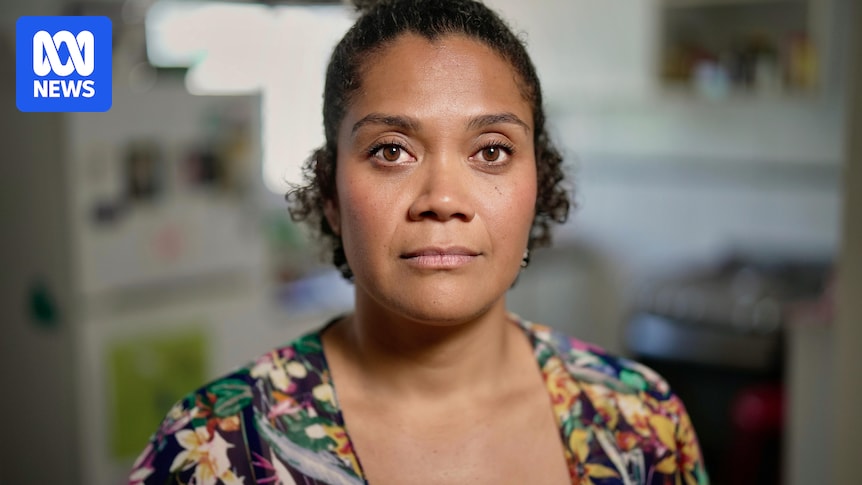Soon after moving abroad to Canada in her 20s, Roxy Aila’s mental health began to unravel.
In a demanding, high-pressure advertising job — and thousands of kilometres away from family in Papua New Guinea and Brisbane — anxiety, depression and loneliness set in for the now-42-year-old.
If you or anyone you know needs help:
- Lifeline on 13 11 14
- Kids Helpline on 1800 551 800
- MensLine Australia on 1300 789 978
- Suicide Call Back Service on 1300 659 467
- Beyond Blue on 1300 224 636 or its COVID-19 support service 1800 512 348
- Headspace on 1800 650 890
- ReachOut at au.reachout.com
- Care Leavers Australasia Network (CLAN) on 1800 008 774
- Brother to Brother on 1800 435 799
“I was really sad … I’d have up days and down days, but there was prolonged sadness [there] for some weeks and months,” Ms Aila said.
“I found it hard to concentrate at work and I wasn’t enjoying socialising or catching up with friends, I found it difficult to get out of bed.
“I wasn’t myself … but I was in a bit of denial and experiencing shame for not having it all together.”
It’s an experience that echoes across the country, with a new national report by Beyond Blue revealing loneliness and social isolation has reached new heights.
Of the 5,000 people surveyed, 30 per cent reported feeling “persistently lonely”, while respondents dealing with loneliness had higher rates of mental health challenges than those experiencing financial distress.
The survey found almost one in two people aged 18 to 24 identified loneliness as a key concern. (ABC News: John Gunn)
Declining ‘sense of community’
Beyond Blue chief executive Georgie Harman said the report detailed some “really concerning findings”, describing loneliness as an “epidemic” in Australia.
“There’s a declining sense of community; people are rating their sense of community lower,” she said.
“I think it points to the way we’re living our lives — we’ve never been more connected in a sense, but the data is showing us that people are feeling increasingly disconnected from each other.”
A ‘life-changing’ run club is helping Australians tackle loneliness
Almost one in two people aged between 18 and 24 identified loneliness as a key concern.
Ms Harman said it does not discriminate.
“When we think about loneliness, we often think of older generations, but in fact, it’s younger people who are saying that they are feeling increasingly lonely, and lonely more often.”
Changing the conversation
Michelle Lim, who heads a coalition of research organisations called Ending Loneliness Together, said loneliness was still a “highly stigmatised” issue.
“In fact, we know about one in two Australians will actively conceal their loneliness and feel ashamed about it,” she said.
Dr Lim said normalising the experience was key, pointing to the need to “start changing the way we talk about it with our friends, our family and our workplaces”.
Michelle Lim says loneliness is still a “highly stigmatised” issue. (Supplied: Michelle Lim)
“And we should talk about connection as a way of just healthy wellbeing,” she said. “All of us will become lonely at any given point as we age and progress through life.
“We need to ensure that if we do become lonely, we’re able to manage our loneliness in a way that doesn’t persist and isn’t as distressing so that we protect our mental health and wellbeing.”
Ms Harman said small gestures could make a big difference.
“Most mental health care actually happens outside of hospitals and health clinics, it happens in communities — schools, in workplaces, around the kitchen time,” she said.
The importance of connection
After nearly three years in Toronto, Ms Aila — a Brisbane yoga instructor — returned home to Australia and sought help.
Roxy Aila, a Brisbane yoga instructor, returned home to Australia and sought help. (ABC News: Michael Lloyd)
Now, she’s found a better work-life balance and can manage life’s curveballs.
“We’re designed to be together, not ride through life on our own, so community is really important,”
Ms Aila said.
“When you’re depressed, anxious and sad, your natural inclination is to draw back and be on your own, but it’s really important as humans to connect with others.”
Ms Aila has found a better work-life balance and can manage life’s curveballs (ABC News: Michael Lloyd)
